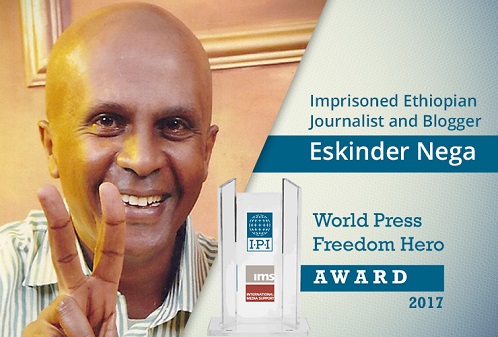
Ethiopian journalist and blogger Eskinder Nega, who has been imprisoned since 2011 after criticizing his country’s abuse of anti-terror laws to silence the press, has been named the International Press Institute (IPI)’s 69th World Press Freedom Hero.
IPI also announced today the Afghan Journalists Safety Committee as the recipient of the 2017 Free Media Pioneer Award in recognition of the group’s courageous and trailblazing work to prevent, combat and monitor attacks on journalists in one of the world’s most dangerous media environments.
Both awards, which for the past three years have been given in partnership with Copenhagen-based International Media Support (IMS), will be presented during a special ceremony on May 18 in Hamburg, Germany during IPI’s annual World Congress and General Assembly.
Press Freedom Hero: Eskinder Nega
IPI’s World Press Freedom Hero Award honors journalists who have made significant contributions to the promotion of press freedom, particularly in the face of great personal risk.
Nega has spent over 2,000 days behind bars since his arrest on Sept. 14, 2011, when Ethiopian authorities accused him of “leading a plan to throw the country into serious political chaos through a series of terrorist acts” and linked him to a banned opposition group. His jailing came shortly after Nega, a persistent critic of Ethiopia’s former long-time ruler and then-Prime Minister Meles Zenawi, published a column questioning the government’s abuse of anti-terror laws to punish journalistic scrutiny.
Nega’s comments were preceded by a wave of detentions under Ethiopia’s broad 2009 anti-terror law, including those of journalists Woubshet Taye and Reeyot Alemu – the 2013 recipient of the UNESCO-Guillermo Cano World Press Freedom Prize – as well as Swedish correspondents Martin Schibbye and Johan Persson.
An Ethiopian court convicted Eskinder Nega in June 2012 of “participation in a terrorist organization” and “planning, preparation, conspiracy, incitement and attempt of (a) terrorist act”. He was sentenced to 18 years in prison the following month, a decision the U.N. Working Group on Arbitrary Detention later said violated international law.
Read the complete story at IPI
